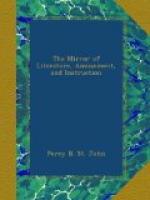Now we must observe, what the master of the Mint and the people about him ought to have observed before, that there is in the first instance a considerable expense incurred in the coinage of the double-sovereigns, without any possible object, except the expense itself may be an object, which is not impossible. We shall have in this coin one of the most clumsy and useless matters of circulation that could be devised. The present sovereign answers every purpose that this clumsy coin can be required for, and even the single sovereign would be a much more convenient coin for circulation if it were divided, as every one knows who knows the trouble of getting change. The half-sovereign is in fact a much more convenient coin. But on this clumsy coin we must have a Latin inscription, as if it were intended only for the society of antiquaries, or to be laid up in cabinets, which we acknowledge would be most likely its fate, except for the notorious bad taste of the British coinage. Of much use it is to an English public to have the classical phraseology of Gulielmus Britanniarum Rex, put in place of the national language. Then too we must have the collar of the Order of the Garter to encircle the national arms, of which this Order is nonsensically pronounced “Decus et Tutamen.” The Glory and Protection. The Order of the Garter the glory and protection of England! We are content to let this absurdity stay in Latin or Sanscrit; English would be shamed by it. The Order of the Garter which goes round the knee of any man, who comes with the minister’s fiat on the subject, and which has no more relation to British glory or British defence than the Order of the Blue Button or the Yellow frog of his majesty the Emperor of China; and this is to go forth on our national gold coin! and for fear that the folly would not be sufficiently spread, it is to be stamped on our crowns and half-crowns! The shillings and sixpences luckily escape: plain English will do for them. And all this goes on from year to year, while we have in the example of France a model of what a mint ought to be. Every foreigner makes purchases at the French mint; and the series of national medals executed there is a public honour and a public profit too. But whoever thinks of purchasing English mintage except for bullion?—With a history full of the most stirring events, we have not a single medallic series—we have scarcely a single medal. But we have in lieu of those vanities a master of the mint, who is tost new into the office on every change of party, who has probably in the whole course of his life never known the difference between gold and silver but by their value in sovereigns and shillings; but who, in the worst of times, shows his patriotism by receiving a salary of no less than five thousand pounds a year?
Monthly Magazine.
* * * * *




